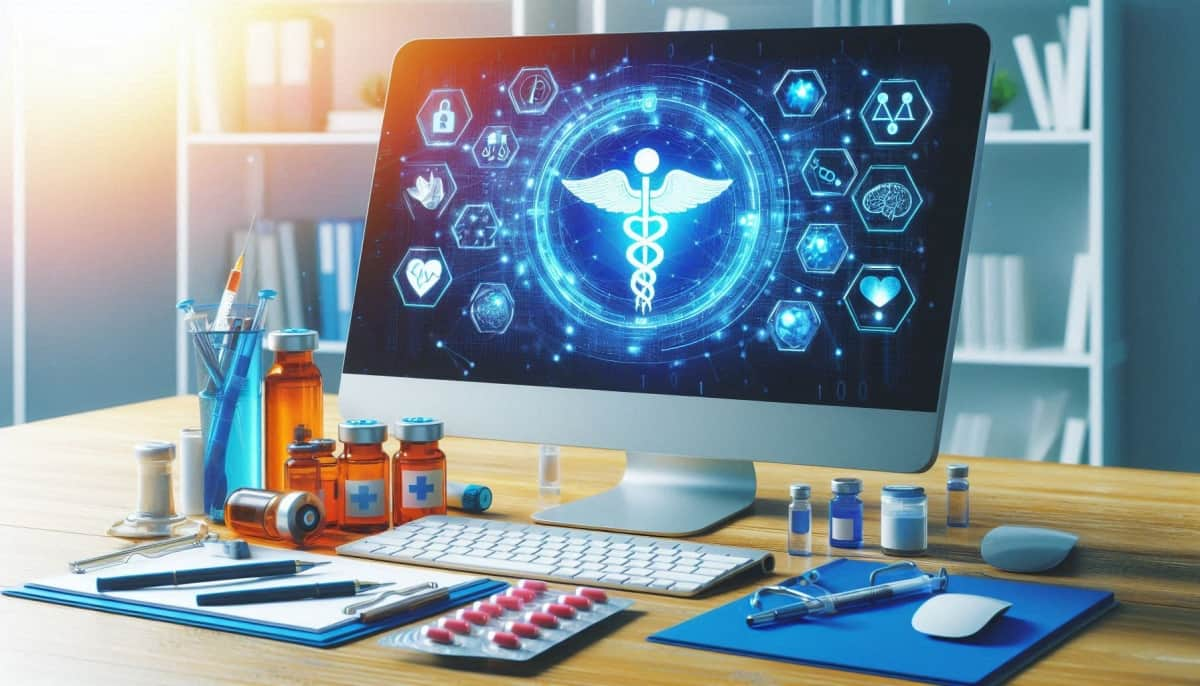Artificial intelligence has supported the ability of modern healthcare to function and improve in multiple areas, particularly in branches such as drug discovery and pathology. AI’s ability to learn and automatically access data from worldwide sources and databases makes it a powerful and essential tool for handling complex topics in the medical field.
As artificial intelligence continues to advance, all fields related to healthcare continue to improve along with it, ultimately benefitting the lives of everyone globally.
AI Helps Professionals Discover Drugs and Their Uses
Before AI began to be used in the medical industry, drug discovery could take atrociously long amounts of time — possibly up to six years — and it was expensive, as it could cost billions of dollars. However, artificial intelligence’s ability to access and connect large amounts of data has allowed companies to discover drugs in quick, inexpensive, and efficient manners.
For example, the powerful tool can analyze key traits such as the toxicity and the bioactivity of a drug sample, and from the analysis, it can make an accurate conclusion of all the possible candidates the drug could be. From there, further testing can be completed with the assistance of AI, and the process of discovering what a sample could be would become drastically shortened and cheaper.
Additionally, the use of artificial intelligence allows the healthcare industry to discover other purposes for certain drugs, a process that can take years and billions of dollars without assistance from AI. By analyzing the properties and molecular structure of an approved drug, artificial intelligence can reach logical conclusions related to other diseases and conditions the new medication can be used to treat, which can therefore lead to discoveries on how some diseases and conditions, once believed to be incurable, can be cured.
The traits that make AI great at discovering drugs also help it create new medication. By analyzing the physical and chemical properties of various approved medications and those of other chemicals, artificial intelligence can reach logical conclusions related to the creation of the new medication, which could later be looked over by medical professionals to confirm the safety of the new medication for humans and to confirm how it can be used.
AI’s support for doing so can ultimately shorten the time and cost of creating new medication, a process that is currently tedious and expensive. However, with a faster pace and lower overall cost, medical companies and patients can benefit extensively due to the efficiency of artificial intelligence’s ability to process and analyze data at a fast pace.
Pathology Can Advance Faster Due to AI Assistance
Pathology is essential to developing new drugs and medications, and by studying various diseases and injuries, medical professionals have been able to improve and create new treatments. However, this process continues to be both expensive and laborious, despite several advancements.
By using AI, however, the results obtained from pathology-related experiments and studies can be quickly evaluated and connected, decreasing the time and the cost of the complex and tedious processes involved with enhancing the global population’s understanding of pathology.
Due to AI’s powerful ability to calculate and analyze, it manages to improve the quantitative accuracy of experiments and studies due to its abilities that help it significantly improve the healthcare industry. Artificial intelligence’s accuracy is crucial to medical facilities because it helps the facilities diagnose a patient, select the proper medication, and other important activities that the healthcare industry performs.
AI can also discover risk factors for certain diseases and mental conditions early on, so treatment can begin early and help prevent all patients from suffering due to an illness that could have been treated early on.
Artificial intelligence’s ability to discover risk factors for diseases and conditions can also help medical professionals discover new symptoms for health problems, which can therefore help create more accurate diagnoses in patients. As a result, patients can be given the proper medication and treatment with little to no testing, a time-reducing and financial benefit to both medical professionals and patients.
The Ethical Considerations of Using AI
While artificial intelligence is an incredibly powerful tool that can benefit all members of the healthcare industry, there are several ethical considerations that must be considered when determining how often AI should be used. Important factors such as patient safety, transparency, and bias are some major points of discussion and controversy that many people often consider when thinking about how much power AI should have in the medical industry.
Artificial intelligence relies on data from global sources to make conclusions about a patient. However, some data it obtains may be inaccurate and misleading, which AI can not always determine. As a result, a patient may be given an incorrect diagnosis or treatment medication if the AI is over-relied on. However, the majority of the time, artificial intelligence tends to be accurate.
Additionally, if a machine powered by AI is monitoring an unconscious patient and there is no medical professional nearby, the AI has a chance of making a mistake that could threaten the well-being and life of the patient. With assistance from a medical professional, however, there is a lesser chance of the AI making the mistake, and the professional can analyze the data as well and determine what needs to be done for the patient’s benefit.
Furthermore, there are many factors to consider when discussing the transparency of AI use in the medical industry. Many patients desire to know how artificial intelligence is being used to help them and how it works, information that should be given to the patient to help build both trust and accountability.
AI can access many databases shared with it by the medical facility and other sources, some of which are involved with the private background of a patient or may have data that is no longer applicable to the patient, which can cause inaccurate diagnoses that can negatively affect the patient’s well-being, especially if improper medication is given.
Biased results from AI often stem from outside sources, including purchasing records, income data, criminal records, and social media, factors that can cause AI to make inaccurate conclusions about a patient’s physical and mental health. These false diagnoses can end up on the patient’s medical record, which can be accessed by other health professionals, possible employers, and those who review health insurance applications. Incorrect diagnoses can negatively impact a patient’s future, so many believe that health professionals should always review the data and confirm certain details with the patient or other trusted sources.
An idea that most people agree upon is that health professionals should work with AI to create the most accurate results. Through cooperation, the results can also be safe and beneficial to everyone involved, and these accurate results can help create breakthroughs on the virus, disease, or condition involved. These discoveries can be published online for others to read about, which educates the global population more on modern healthcare.
The Future of AI in Modern Healthcare
As AI continues to advance, more factors will need to be put into consideration about its use and how much it should be involved in the medical industry. Despite the several considerations that will need to be discussed, artificial intelligence will certainly continue to advance branches of healthcare including drug discovery and pathology.
AI’s future advancement will help discover and create medications in a faster and more inexpensive way, and it will positively impact the speed at which patients are diagnosed and how often diseases and conditions are discovered.
Overall, artificial intelligence is set on a path that will ultimately benefit the modern healthcare industry and all patients due to its ability to create accurate conclusions through data analysis and the help of healthcare.
RELATED TOPICS
- Using GenAI in Your Business? Here Is What You Need To Know
- Apple Watch saves life by notifying user about unusual heart rate
- ChatGPT Update Enables Chatbot to “See, Hear, Speak” with You
- Collaboration Across Platforms Could Supercharge AI Performance
- ChatGPT Improve Healthcare, But Industry Needs Secure Database









